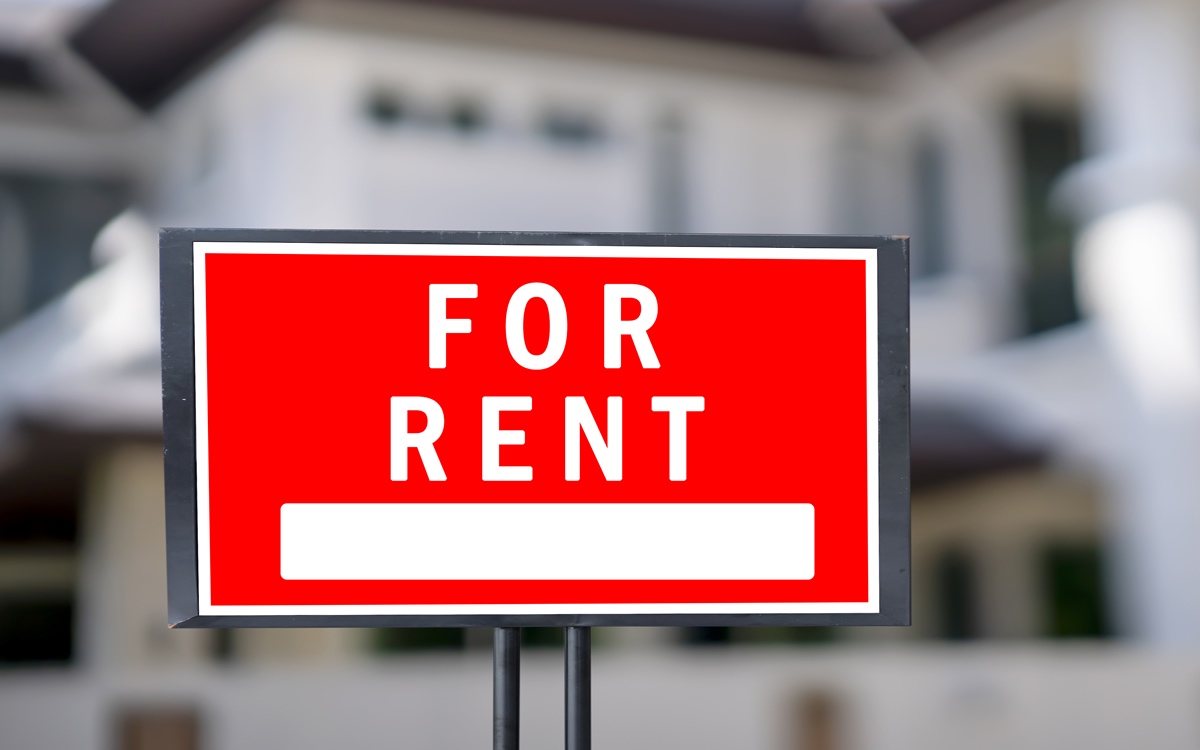Real Estate
So, you want to be a landlord?
Real estate is still a wealth builder

Being a landlord is a multifaceted role. Not only do you own the property, but also you may decide to manage it yourself.
As part of that process, you must find suitable tenants who can show that they have good credit and can afford the rent, have paid rent on time at other properties, and have kept the places they lived in good repair.
You must determine what the rent should be, handle routine and emergency maintenance, keep track of related finances, and ensure you have the appropriate licenses.
It’s also important to have a thorough understanding of local rental and tenants’ rights laws and homeowner or condominium association rules. And let’s not forget compliance with fair housing laws.
Many people find this daunting and opt to hire a real estate agent to, at minimum, determine the rent, market the property, vet the tenants, and complete standardized leases. As with selling houses, leasing compensation is negotiable. Locally, you should expect to pay a minimum of one month’s rent.
In most areas in the DMV you must have a license to rent a home. Often, this requires a visit by a city inspector, correcting any Uniform Building Code violations, remediation of lead paint, and disclosure of potential hazards in the home, along with associated costs.
While some people are comfortable with overseeing a rental property themselves, the Property Management (PM) portion of the real estate industry is there for those who are not. If you are leaving the area, it’s even more important to have someone local to take care of your home and your tenants on a day-to-day basis.
PM fees generally run from 8 to 10% of the monthly rent. For that, you get a menu of services that will likely include collecting rent, paying mortgages, assessments, and other bills, vetting new tenants, ensuring the property is properly maintained, and dealing with any legal issues that might arise, such as tenant disputes and evictions.
It’s critical to read your management contract to understand your responsibilities and those of your property manager. Also at issue is whether the company is owed a commission if the tenant they secure ultimately buys the property.
You may be asked to begin with a repair escrow that can be supplemented as needed. After monetary tasks are complete, you will receive any balance due you as the landlord or be asked to supplement your account should you have a deficit.
A standard lease will outline a tenant’s maintenance responsibilities, who pays utilities, property access, pet restrictions, termination provisions, and additional paragraphs as may be required by each jurisdiction or agreed upon by the parties.
So now that you have the perfect tenant and management system in place, what happens if you want to sell your property?
In general, if the tenant has a lease, that lease continues upon the sale of the home and security deposits and copies of leases are transferred from you to the next owner at settlement.
In many jurisdictions, even a month-to-month tenant can continue to reside in the property as if she were still under the terms of the original lease as long as she continues to pay rent and does not violate the initial terms.
D.C.’s Tenant Opportunity to Purchase Act (TOPA) has been amended to specify that only residents who are age 62 or older, those who have a disability, and those who signed their lease and began occupancy prior to the spring of 2018 are entitled to first right of refusal in the sale. Of course, a tenant is free to make an offer on the home he lives in along with any other buyers.
If you want your tenants to vacate early or quickly so that you can make repairs, repaint, and stage the home prior to marketing, it may behoove you to offer financial incentives to assist with their move. It’s often a cost of doing business.
More people are looking for homes to live in rather than seeking investment property, so having tenants with a long-term lease who want to remain will likely decrease your buyer pool and, as a result, may affect your ultimate sales price. Investor buyers, however, will be more interested in the monetary return on their investment than glitz and glam. Make sure you have the property’s rental history available to review.
So, do you want to be a landlord? Maybe. Real estate is still a wealth builder. Just be sure you have sufficient funds available to withstand a few months with no income while you change tenants and always keep a handyman and a landlord/tenant attorney on speed dial.
Valerie M. Blake is a licensed Associate Broker in D.C., Maryland, and Virginia with RLAH Real Estate / @properties. Call or text her at 202-246-8602, email her via DCHomeQuest.com, or follow her on Facebook at TheRealst8ofAffairs.
Real Estate
April showers bring May flowers in life — and in real estate
Third time’s the charm for buyer plagued with problems

Working in the real estate sector in D.C. can be as uniquely “D.C.” as the residents feel about their own city. On any given day, someone could be selling a home that their grandmother bought, passed on to the relatives, and the transfer of generational wealth continues. In that same transaction, the beginning steps of building of generational wealth could be taking place.
Across town, an international buyer could be looking for a condo with very specific characteristics that remind them of the way things are “back home.” Maybe they want to live in a building with a pool because they grew up by the sea. Maybe they want a large kitchen so they can cook grandma’s recipes. Maybe they will be on MSNBC once a month and need to have a home office fit for those Zoom sessions where they will be live on air, or recording their podcast. Perhaps they play the saxophone and want a building with thick walls so they can make a joyful noise without causing their neighbors to file a cease-and-desist order.
What I found fascinating was getting to know my buyers. Why were they purchasing their property? What did they want to do with it? Was this their grandmother’s dream that they would have a place of their own someday? Did they finally think they would write that award-winning play in the home office? What dreams were going to be fulfilled while taking part in this transaction?
Somedays, the muck and paperwork slog of navigating home inspection items and financing checklists could get to be distracting at best, and almost downright disheartening at worst.
One of my clients was under contract on THREE places before we finally closed on a home. One building was discovered to have financing issues, and the residents were not keeping up with their condo fees. Another building had an issue with the title to the unit, which meant the seller could not sell the home for at least another year until that legal snag was resolved. As the months rolled by, she was losing heart and feeling defeated. When we finally found the third home, everything seemed great – and then about two weeks before the settlement, the rains came down and the windows leaked into the bedrooms.
Another delay. (Our THIRD). This time, for several more weeks.
I think she wanted to pack a suitcase, go to the airport, get on a plane somewhere and never come back. What ultimately happened? The building repaired the windows, the seller’s insurance replaced the hardwood floors, and she bought her first condo, which she still enjoys to this day.
As Dolly Parton says, “If you want the rainbow, you’ve got to put up with a little rain.” And finally, after months of looking, waiting, and overcoming obstacles, the rainbow peeked out from behind the clouds.
Joseph Hudson is a referral agent with Metro Referrals. He can be reached at 703-587-0597 or [email protected].
Real Estate
Spring updates to sell your home for pride and profit
Consider new landscaping, power washing, creative staging

Selling a home is a big deal for anyone, but for members of the LGBTQ+ community, it comes with unique considerations—from finding affirming professionals to ensuring your home is represented in a way that reflects your values. Whether you’re a first-time gay home seller or a seasoned LGBTQ+ homeowner looking to move up, maximizing your home’s value is key to a successful and empowering sale.
Here’s how to prepare your home, your mindset, and your real estate strategy to get the most value—financially and emotionally—from your home sale.
1. Start with an LGBTQ+-Friendly Real Estate Agent
Before diving into renovations or staging, make sure your agent truly understands your needs. A gay-friendly or LGBTQ+-affirming real estate agent brings more than just market expertise—they bring cultural competence, safety awareness, and a network that supports you throughout the selling process.
At GayRealEstate.com, you can find experienced, vetted LGBTQ+ real estate agents who have been proudly serving the community for over 30 years. Working with someone who shares or supports your identity ensures your selling journey is respectful, inclusive, and effective.
2. Enhance Curb Appeal—With a Welcoming Vibe
The outside of your home is the first impression a potential buyer gets. Make it count—especially for LGBTQ+ buyers looking for a home that feels safe and welcoming.
- Fresh landscaping: Add colorful flowers, neatly trimmed shrubs, or low-maintenance greenery to appeal to eco-conscious buyers.
- Update the entrance: A new front door, stylish lighting, or even a rainbow doormat can make your home feel like a safe space from the start.
- Clean and repair: Power wash the exterior, touch up paint, and make any necessary repairs to gutters, windows, or siding.
3. Stage with Intention and Inclusivity
Home staging can add thousands to your sale price. But beyond the usual decluttering and neutral palettes, think about how your space tells a story—and who it’s telling it to.
- Create a warm, inclusive feel: Subtle touches like LGBTQ+ art, books, or even coffee table magazines can show off your personality and affirm the space for queer buyers.
- Depersonalize—but don’t erase: You don’t need to hide your identity to appeal to buyers. Let your home feel lived in and loved—while still being a blank canvas others can imagine themselves in.
- Highlight multi-use areas: Home offices, gender-neutral nurseries, or flex spaces resonate with LGBTQ+ families and professionals.
4. Update Kitchens and Bathrooms Strategically
These rooms matter most to buyers—and even small updates can yield big returns.
- Kitchen: New cabinet hardware, a fresh backsplash, and modern lighting can elevate the entire room without a full remodel.
- Bathroom: Replace old fixtures, re-caulk tubs and sinks, and add plush towels and inclusive décor.
- Energy-efficient upgrades: Touchless faucets, smart appliances, or low-flow toilets are not only trendy—they signal sustainability, which matters to LGBTQ+ buyers.
5. Make Your Home More Energy Efficient
LGBTQ+ homebuyers often prioritize sustainability. These updates not only reduce energy bills but make your home more marketable.
- Install a smart thermostat (like Nest or Ecobee)
- Upgrade insulation or windows
- Consider solar panels (especially in sun-drenched regions like California or Florida)
Bonus: You may qualify for state or federal tax credits, which can be a great selling point.
6. Know and Advocate for LGBTQ+ Housing Rights
Although housing discrimination is illegal under the Fair Housing Act, it still happens. As an LGBTQ+ seller, be aware of your rights—and those of potential buyers.
- Avoid steering or bias: Even with good intentions, make sure you’re not inadvertently influencing who views or buys your home based on identity.
- Work with affirming professionals: From inspectors to lenders, choose partners who support inclusive practices.
- Report discrimination: If you or a buyer encounters bias, report it to HUD or your local housing authority.
7. Price Your Home Right—and Market It Smartly
Setting the right price is essential to maximizing value. Your LGBTQ+-friendly agent can run a comparative market analysis, considering current trends and buyer demographics.
- Leverage LGBTQ+ real estate networks: Promote your home through platforms like GayRealEstate.com to reach an audience that understands and values your space.
- Use inclusive language in listings: Avoid gendered terms or heteronormative assumptions. Instead of “his and hers closets,” use “dual walk-ins” or “double closets.”
- High-quality photos and video tours: Showcase your home with professional, visually inclusive marketing that appeals to diverse buyers.
8. Consider Timing and Local LGBTQ+ Trends
Selling during WorldPride or just before local LGBTQ+ events may boost visibility. Also consider if you’re in or near an LGBTQ+ friendly city or neighborhood.
Not sure which areas are top destinations? GayRelocation.com tracks and shares the best cities for LGBTQ+ homebuyers, helping you tap into motivated buyers.
Final Thought: Sell with Confidence—and Community
Selling your home isn’t just about getting top dollar—it’s about closing a chapter with pride and integrity. When you center your values, work with LGBTQ+ affirming experts, and prepare your home with purpose, you’re not just maximizing your home’s value—you’re creating an empowering experience for yourself and the next owner.
Whether you’re buying, selling, or both—GayRealEstate.com is your trusted partner in every step of your journey. With a nationwide network of gay and lesbian realtors, decades of experience, and deep community ties, we ensure your home transition is safe, smart, and full of pride.
GayRealEstate.com is the nation’s leading online platform connecting LGBTQ+ home buyers and sellers with LGBTQ+ friendly real estate agents, ensuring a safe and supportive experience.
Scott Helms is president of GayRealEstate.com. To find an agent or learn more, visit GayRealEstate.com, GayRelocation.com or call 1-888-420-MOVE.
Real Estate
Navigating DMV real estate market during political unrest
Reductions in federal employment have introduced uncertainties

The Washington, D.C.-Maryland-Virginia (DMV) region has long been recognized for its robust housing market, underpinned by the presence of the federal government and a diverse economic landscape. Recent massive reductions in federal employment have introduced uncertainties, yet the area continues to offer compelling reasons for prospective homebuyers, particularly within diverse communities.
While the federal government has traditionally been a significant employer in the DMV, the region has proactively diversified its economic base. Sectors such as technology, professional services, education, and healthcare have expanded, mitigating the impact of federal job cuts. This diversification fosters some economic resilience, which offers our area a semblance of protection against the impending unknowns that we currently face. Nothing can shield real estate entirely; however, our area tends to survive these types of changes better than other parts of the country.
Despite concerns over federal layoffs, the DMV housing market has demonstrated notable stability. Analyses indicate that the number of active listings, sold properties, and median sales prices have remained steady on a year-over-year basis. This steadiness suggests that the market is adapting to changes without significant disruption.
Furthermore, while there has been a slight increase in home listings, this trend aligns with typical seasonal variations and does not solely reflect federal employment changes. The luxury property segment, in particular, continues to thrive, indicating sustained interest and investment in the region.
The DMV region is renowned for its cultural and demographic diversity, with areas like Montgomery County, Md., being among the most ethnically diverse in the nation. This inclusivity extends to various communities, including LGBTQ individuals, fostering a welcoming environment that enhances the area’s appeal. Even though the current administration is fostering anti-diversity ideology, I remain confident that our LGBTQ community will continue to thrive even as these destructive forces work against us.
Local governments within the DMV have implemented policies aimed at promoting affordable housing and preventing displacement, particularly in the wake of economic shifts. Initiatives like the Douglass Community Land Trust in Washington, D.C., exemplify efforts to maintain housing affordability and support community stability.
Additionally, jurisdictions such as Montgomery County have longstanding Moderately Priced Dwelling Unit (MPDU) programs that require developers to include affordable housing in new residential developments. These policies contribute to socioeconomically mixed neighborhoods, benefiting diverse populations.
Despite Elon Musk’s brandishing of a chainsaw to the federal workforce, our real estate market continues to thrive. The DMV region maintains its appeal. Economic diversification, market stability, commitment to diversity and inclusion, and progressive housing policies collectively contribute to an environment that supports and attracts diverse communities. Prospective homebuyers can find reassurance in the region’s resilience and ongoing efforts to foster an inclusive and vibrant community. These are only a few among the many reasons to have a positive outlook while considering real estate options in our area.
It is important to consider working with brokerages, brokers, agents, lenders and title companies who align with our community and our objectives. Not all LGBTQ agents work for brokerages that support or understand the needs of the members of our community. Do your research and find out who has donated money to what political causes. Now more than ever we must support members of our community to protect our way of life and our very existence.
Stacey Williams-Zeiger is president/principal broker of Zeiger Realty Inc. Reach her at [email protected].
-

 Federal Government4 days ago
Federal Government4 days agoHHS to retire 988 crisis lifeline for LGBTQ youth
-

 Opinions4 days ago
Opinions4 days agoDavid Hogg’s arrogant, self-indulgent stunt
-

 District of Columbia4 days ago
District of Columbia4 days agoD.C. police seek help in identifying suspect in anti-gay threats case
-

 Virginia4 days ago
Virginia4 days agoGay talk show host wins GOP nom for Va. lieutenant guv










